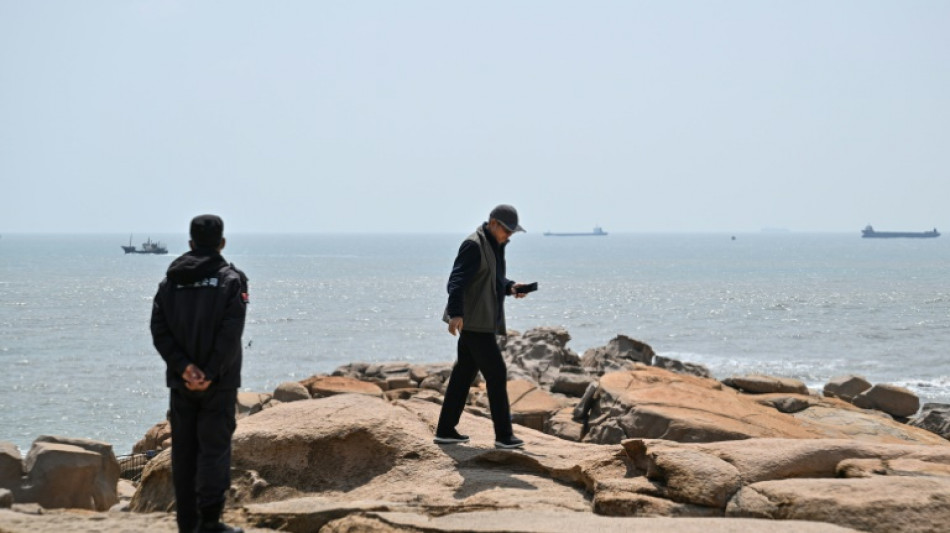
China probes for key target weak spots with 'paralysing' Taiwan drills

China's military drills around Taiwan this week aim to send a clear message to the island's leadership, analysts say -- in the event of war, Beijing can cut them off from the outside world and grind them into submission.
And while previous drills have sought to test Taipei's response times to Chinese incursion, Beijing says this week's exercises are focused on its ability to strike key targets such as ports and energy facilities on the island.
"Taiwan is vulnerable from an energy point of view and China is playing up that vulnerability," Dylan Loh at Singapore's Nanyang Technological University told AFP.
The air and sea around the self-ruled island have swarmed with Chinese jets and warships in what Beijing has dubbed its "Strait Thunder" exercises -- punishment, it said, for the separatist designs of Taiwan's "parasite" leader Lai Ching-te.
The drills are located in the middle and southern parts of the Taiwan strait -- a vital artery for global shipping.
The island also imports nearly all of its energy supply and relies heavily on food imports, meaning in the event of a war, a blockade could paralyse the island -- a fact Beijing is keen to press.
"Taiwan's depth is shallow and has no buffer zone. Taiwan is also short of resources," Major General Meng Xiangqing, professor at the PLA National Defence University, told state broadcaster CCTV.
"If Taiwan loses its sea supply lines, then the island's resources will quickly be depleted, social order will fall into chaos, and people's livelihoods will be affected," he said.
"In the end, it will be the regular people of the island who suffer."
- 'Blockade' -
One Taipei-based analyst said Beijing's drills were shifting focus, from practising ways to prevent foreign forces coming to Taiwan's aid in the event of a war, to asserting full control over the waters around the island.
"The containment and control drills are designed to test the ability to restrict supply routes to Taiwan and deter foreign commercial vessels from docking," said Su Tzu-yun, a military expert at Taipei's Institute for National Defense and Security Research.
"The message to international shipping is that all destinations are open -- as long as they're not Taiwan," he added.
While Tuesday's exercises were focused on offensive operations against the island, Lin Ying-yu, a military expert and assistant professor at Tamkang University, said Wednesday's "centre on practising a blockade of Taiwan".
Such a tactic echoes techniques used in the invasion of Ukraine by Russia, which has since February 2022 also launched thousands of strikes against energy infrastructure -- to debilitating effect.
A graphic shared by the military made the objective clear: declaring "paralysing strikes" were being prepared and showing missiles raining down on the island's southern port city of Kaohsiung.
Taiwan's leaders, it warned, were "heading for a dead end".
Another touted the army's skills in "controlling energy channels, cutting off supply arteries," -- and showed graphics of explosions on targets on the island's east, west and south.
- 'Deadly surprise attack' -
The drills are driven by growing fears in Beijing that its long-awaited unification with Taipei is further away than ever.
Bonny Lin, Director of the China Power Project at the Center for Strategic & International Studies in Washington, told AFP there was "an assessment in Beijing that China needs to do more to step up the process for unification with Taiwan".
That included, she said, "punishing Taiwan for any perceived provocative activities and more firmly countering potential foreign intervention to assist Taiwan".
Beijing is also seeking to highlight just how unpredictable it can be in attacking the island.
"The opponent won't know which card we will play, including when we'll play it," Fu Zhengnan, an expert at the Chinese military's Academy of Military Science, told CCTV.
"The PLA is becoming more and more like an unpredictable magician," he said.
This week's drills come just days after US defence chief Pete Hegseth vowed the United States would ensure "deterrence" across the Taiwan Strait in the face of China's "aggressive and coercive" actions.
Wen-Ti Sung, a nonresident fellow at the Atlantic Council's Global China Hub, said "Straight Thunder" was testing that claim.
"China wants to impose stress test after stress test and create an opportunity where the Trump administration will have to respond," he said.
R.Keller--BlnAP

 London
London

 Manchester
Manchester
 Glasgow
Glasgow
 Dublin
Dublin
 Belfast
Belfast
 Washington
Washington
 Denver
Denver
 Atlanta
Atlanta
 Dallas
Dallas
 Houston Texas
Houston Texas
 New Orleans
New Orleans
 El Paso
El Paso
 Phoenix
Phoenix
 Los Angeles
Los Angeles



